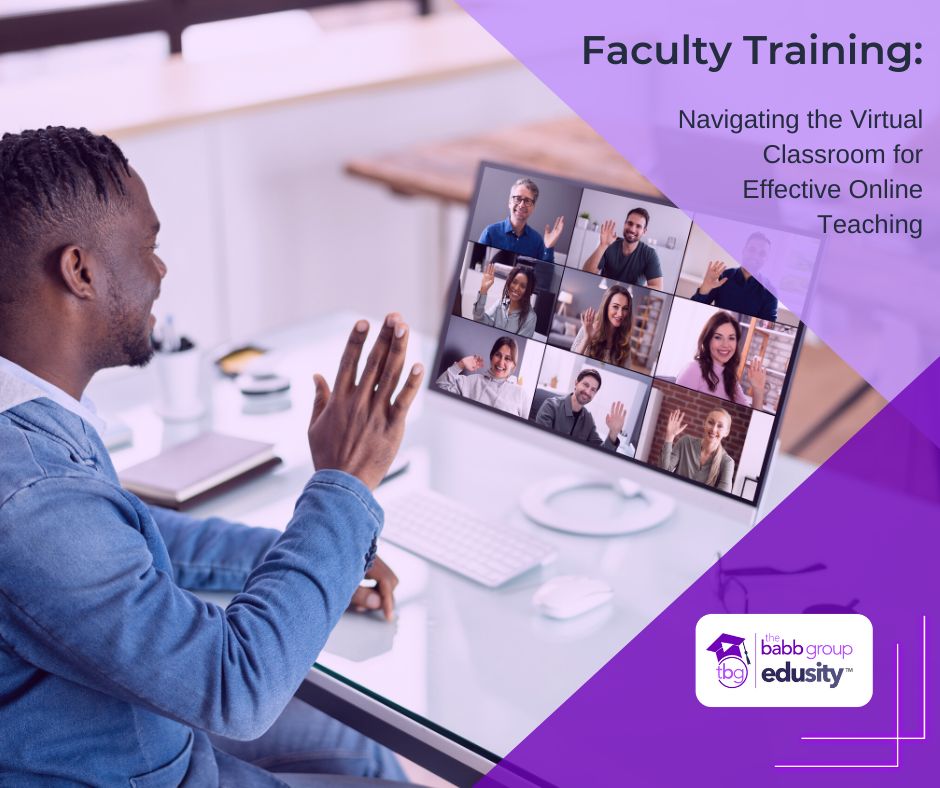The CHLOE 8 report indicates two-thirds of schools are investing in online programs. As universities continue to embrace digital platforms, they must also invest in training faculty to excel in the virtual classroom. We outline the core components of training faculty for online teaching, from mastering the Learning Management System (LMS) to fostering engagement and community. 
-
Mastering the Learning Management System (LMS)
The Learning Management System is the cornerstone of online education. Faculty members must be well-versed in the functionalities and nuances of the LMS used by their institution. Comprehensive training should cover the following:
Navigational Skills: Familiarizing instructors with the LMS layout, including how to upload resources, create modules, and manage assignments.
Communication Tools: Demonstrating discussion boards, announcements, and messaging features to facilitate seamless interaction.
Content Delivery: Training on uploading lecture materials, videos, and quizzes, ensuring a smooth flow of content for students.
Grading: Faculty need to understand how to create and upload rubrics into an LMS, how to effectively use embedded rubrics to grade, how to set up and manage the gradebook, and how and where to provide feedback.
-
Training on Facilitating Effective Online Discussions
Engaging in thoughtful discussions is the heart of online courses. Faculty should receive guidance on:
Setting Clear Expectations: Instructors must outline discussion guidelines, participation expectations, and evaluation criteria.
Promoting Thoughtful Dialogue: Encouraging faculty to pose open-ended questions that stimulate critical thinking and foster diverse perspectives.
Moderation Techniques: Teaching faculty to facilitate discussions, keeping them on track, and encouraging respectful student interactions.
You might also like Embrace the Future of Higher Ed: Invest in Online Learning
-
Adapting In-Class Assignments for the Online Environment
Instructors often wonder how to translate traditional assignments to the digital realm. Training should focus on:
Restructuring Assignments: Showing faculty how to modify in-person projects into online-friendly formats, such as multimedia presentations or discussion-based assessments.
Clear Instructions: Emphasizing providing concise, step-by-step instructions for online assignments.
Tech Proficiency: Ensuring instructors are comfortable with the tools required for assignments, such as online survey platforms or collaborative document editors.
-
Best Practices for Crafting Effective Online Assignments
Well-designed assignments enhance student learning and engagement. Faculty training should cover:
Alignment with Objectives: Instructors should learn to create assignments that align with course objectives and desired learning outcomes.
Universal Design for Learning and Accessibility: Instructors need to understand techniques to create an accessible classroom so learners of all backgrounds and abilities can succeed.
Variety in Formats: Encouraging a mix of assignments like essays, quizzes, case studies, and group projects to cater to different learning styles.
Timely Feedback: Stressing the importance of providing constructive feedback promptly to guide student progress.
Sign up for The Babb Group’s monthly newsletter for trends in higher ed and practical ways to implement best practices.
-
Fostering Student Engagement, Connection, and Community
Personalized Communication: Training instructors to address students by name, share personal anecdotes, and create a warm online presence.
Virtual Office Hours and Availability: Encouraging faculty to hold regular online office hours or provide the option for virtual meetings with students when needed.
Collaborative Activities: Suggesting collaborative projects that encourage students to work together, fostering a sense of belonging.
The shift to online teaching is an opportunity for growth, innovation, and enhanced student experiences. By providing comprehensive training in mastering the LMS, facilitating discussions, adapting assignments, crafting practical tasks, and fostering engagement, higher education institutions can empower their faculty to excel in the virtual classroom. As we further embrace the digital frontier, the commitment to quality education remains unwavering, and well-trained faculty are at the forefront of this transformative journey.
Talk to The Babb Group about a custom-designed faculty training program to empower your employees.
Angela Britcher
Latest posts by Angela Britcher (see all)
- Enhancing First-Year Experiences in Higher Education - August 1, 2024
- Enhancing Education with Virtual Reality: A Hands-On Approach - June 27, 2024
- Higher Education Trends: Insights from Our COO, Sheila Fry - June 13, 2024
